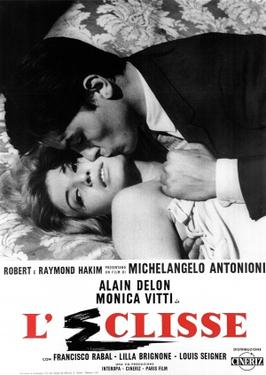"Some like it cold. Michelangelo Antonioni on alienation, this time with Alain Delon and, of course, Monica Vitti. Even she looks as if she has given up in this one."
I'm still an admirer of Pauline Kael's film criticism, but it has dated. She did a great service in her heyday, the 1970s, by cutting through the thickets of snobbery to advance the careers of American filmmakers like Robert Altman and Sam Peckinpah. But that often meant attacking "art house" filmmakers like Antonioni and Alain Resnais, poking at their supposed intellectual pretensions. Although I was never a "Paulette," my career as a professional film critic having been a matter of a few months reviewing for a city magazine, I think I qualified at least as a Kaelite: one who took her point of view as definitive. For a long time, I scoffed at films by Antonioni, Resnais, and others like Ingmar Bergman who got glowing notices from the high-toned critics but zingers from Kael. The bad thing is that I missed, or misinterpreted, a lot of great movies; the good thing is that I can spend my old age rediscovering them. And
L'Eclisse is a great movie. One that, to be sure, Kael could dismiss as "cold" and mock for its director's use of Monica Vitti as a vehicle for his views on "alienation." I will grant that Vitti's limited expressive range can be something of a hindrance to full appreciation of the film. But it would have been a very different movie if a more vivid actress like Jeanne Moreau or Anna Karina or even Delphine Seyrig had played the role of Vittoria. Vitti's marmoreal beauty is very much the point of the film: She is irresistibly attractive and at the same time frozen. Alain Delon's lively Piero begins to become blocked and awkward in his attempts to rouse her passion. In the opening scene, in which Vittoria tells Riccardo (Francisco Rabal) that she's leaving him, the two behave in an almost robotic, mechanical way, unable to release anything that feels like a natural human emotion at the event. We see later that Vittoria is able to let herself go, but only when sex is not in the offing and when she is playing someone other than herself: i.e., when she blacks up and pretends to be an African dancer. But Marta (Mirella Ricciardi) puts a stop to this by saying "That's enough. Let's stop playing Negroes." Marta, a colonial racist who calls black people "monkeys," evokes the repressive side of European civilization, but
L'Eclisse transcends any pat statements about "alienation" through its director's artistry, through the way in which Antonio plays on contrasts throughout. We move from the slow, paralyzed male-female relationships to the frenzy of the stock exchange scenes, from Vittoria's rejection of Piero's advances to scenes in which they are being silly and having fun. Nothing is stable in the film, no emotion or relationship is permanent. And the concluding montage of life going on around the construction site where Vittoria and Piero have seemingly failed to make their appointment is one of the most eloquent wordless sequences imaginable.
